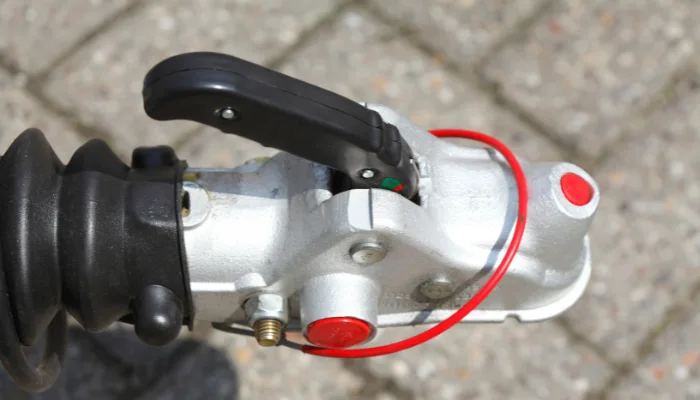This post may contain affiliate links which means I may receive a small commission for purchases made through the links. Learn More
Trailer hitch couplers are an essential component of any trailer hitch system. They are responsible for connecting the trailer to the towing vehicle. But when they are not working properly, it can be dangerous and cause damage to both the vehicle and the trailer.
But many people claim that they face some common problems in trailer hitch couplers. To be honest, it gets irritating when you face a problem but doesn’t know the solution. Unfortunately, there is no comprehensive solution that could give you peace of mind.
So, In this blog post, I will discuss the 5 problems associated with trailer hitch couplers and provide solutions to help you fix them. It means that the next time you come across this problem, you’ll be able to fix it by yourself.
Related Article: What are Different Types of Trailer Hitches and Classes?
Problem 1 – Loose Coupler
A loose coupler is one of the most common problems associated with trailer hitch couplers. This occurs when the coupler is not tight enough. Even if you try to tighten it, you won’t be able to fix it. The connection between the trailer and the vehicle won’t be secure perfectly. This can lead to a dangerous situation, as the trailer can become detached from the vehicle while in motion. The common cause of loose coupler are listed below;
- Improper installation
- Wear and tear on the coupler
- Lack of regular maintenance
Solution
Installation should be done with care and professional help. The solution to a loose coupler is to tighten it with a wrench. It is important to regularly check the tightness of the coupler, especially before each trip. Keep in mind that if the coupler is worn out, then you will have to replace it.
Problem 2 – Bent or Damaged Coupler
A bent or damaged coupler can also be a serious problem. Most of the time, it happens when the coupler is hit or bumped, or when it is overloaded. A bent or damaged coupler can cause serious problems. The most common reason for bent couplers are listed below
- Accidents or collisions
- Overloading
Solution
If your coupler has been damaged to some extent, I would suggest you replace it instead of getting it repaired. This can be done by a professional or by someone with experience working on trailer hitch couplers.
Problem 3: Rust or Corrosion
Rust or corrosion is the most common problem for trailer hitch couplers. You’ll see this more often when the coupler is exposed to water or moisture, which can cause it to rust or corrode. A rust or corroded coupler can become weaker, which can cause the trailer to become detached from the vehicle.
Solution
The solution to rust or corrosion is to clean and protect the coupler with a rust inhibitor. You can apply grease or any other lubricant that can also give them an extra protection layer to your coupler. Keep in mind that If the coupler is severely corroded, then you will have to replace it. If the coupler has no rust, then apply grease or an inhibitor to stop it from getting rust.
Problem 4 – Incorrect Ball Size
An incorrect ball size can also be a problem for trailer hitch couplers. When you use the wrong size ball for the coupler and trailer then you will realize that the hitch coupler is not working perfectly. This usually happens because those people know literally nothing about the hitch and its coupler.
Solution
The solution to an incorrect ball size is to use the correct ball size for the coupler and trailer. You should read the user manual or contact the hitch manufacturer to get complete information about the ball so that you don’t make the mistake of using the wrong ball.
Problem 5 – Latch Failure
A latch failure can also be a problem for trailer hitch couplers. You will face this problem when the latch becomes worn or damaged, and it can’t secure the coupler properly to the ball on the vehicle. Old hitch couplers also create such problems.
Solution
The solution to a latch failure is to check the latch for wear and tear. If you’re using an old hitch coupler, replace it to get perfect results. I suggest you regularly inspect the latch for any signs of wear or damage, especially before each trip.
Also Read: Common Andersen Weight Distribution Hitch Problem & their Solution
How Do You Maintain a Trailer Coupler?
Proper maintenance of trailer couplers is crucial to ensure safe and smooth towing. I’ve done some research and talked to my friend who owns hitches to give you a kind of checklist so that you can take care of your hitch couplers.
- If any rust or corrosion is found on the trailer coupler, then it should be removed with a wire brush and treated with a rust inhibitor.
- Always lubricate the coupler as it helps to prevent wear and tear on the coupler components.
- The locking mechanism on the coupler should be checked regularly to ensure it is functioning properly.
- Over time, the coupler components can wear or become damaged. If any parts of the coupler are worn or damaged, they should be replaced to ensure a secure connection.
Frequently Asked Questions
It depends on the extent of the damage. If the coupler is bent or damaged, then you will have to go to a professional mechanic. But If the problem is simply a loose coupler or rust, you may be able to fix it yourself with a wrench or rust inhibitor.
No, it is important to use the correct size ball for your coupler and trailer. Using a different size ball will surely cause problems with the coupler
Conclusion
Look, safety should always be your top priority when towing a trailer, and when you see a problem with the hitch coupler, immediately solve them as it can cause problems for you. In this guide, I have discussed a few common problems that people face with hitch couplers and given their solutions. I hope this guide will be useful for you.

I’m Ahmad – the owner of this website and the writer of this post. I’ve spent 15 years in the automotive industry, especially among the hitches. What you’re reading is the experience of my 15 years.

